Thank you for asking: pregnancy, isolation, and hope during a global pandemic
Jennifer Eidum
Keywords: pregnancy, secondary infertility, tenure-track job, parenting
Categories: Parenting and Possibility in Impossible Times; Academic Pressures (or Critiques of Neoliberal Horseshit Productivity Expectations, as suggested by Amy Vidali)
I recently completed a Zoom research interview about my experience being pregnant during the COVID-19 pandemic. At the end, the researcher asked if I had anything else I wanted to say that she hadn’t asked about. I paused, and then began: “Just... thank you for asking. Being pregnant in a pandemic has been so isolating and I rarely get to talk about it..."
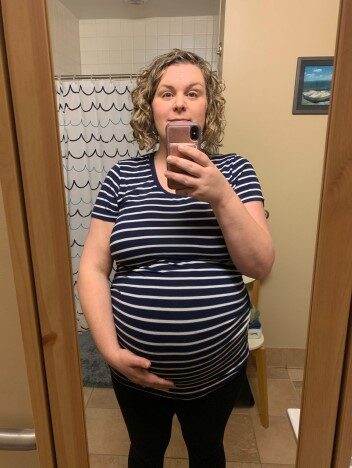
Image Description: Image of a pregnant woman taking a selfie in a bathroom mirror.
Being pregnant in a pandemic has been incredibly lonely. Being pregnant in a pandemic after infertility and pregnancy loss was filled with fear and anxiety. Being a pregnant caregiver, and then new mother of two, and then tenure-track assistant professor in a pandemic has been the juggling act of a lifetime.
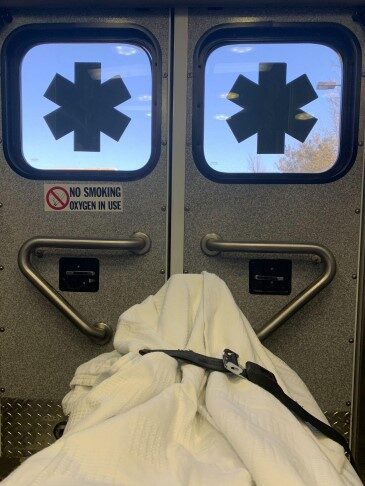
Image Description: Image of feet under a blanket on a stretcher in an ambulance facing the back ambulance doors.
When I was persevering through miscarriages and an ectopic pregnancy to conceive my second child, I had so many hopes and dreams for when a pregnancy would finally “stick.” Secondary infertility is tricky: you’ve been there before, so you “know” your body is capable, and for me it felt like a constant calculation about how to optimize my body so that it could carry a healthy pregnancy. It’s a mind-fuck. After surgery for an ectopic pregnancy in December 2019, my partner and I were filled with hope that maybe wonky fallopian tubes were the problem and we could finally have our second child.
***
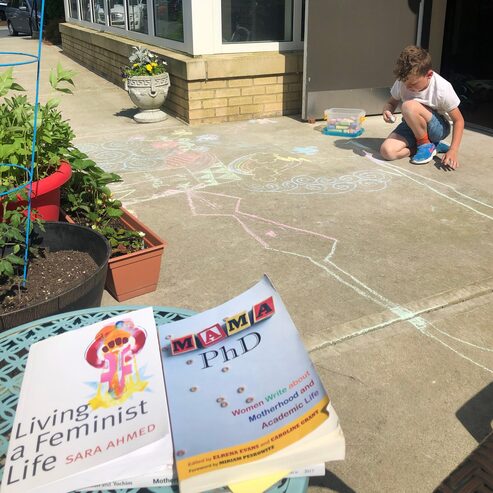
Image Description: Image of a concrete patio with the books Living a Feminist Life and Mama PhD in the foreground with a child writing with chalk in the background.
I have become very comfortable with bringing my identity as a mother into my work as a faculty member, but this identity is one that I have to actively make space for. As a faculty-in-residence, my son has lived on campus and attended campus events for years. As I struggled to get pregnant with my second child, though, I felt that I couldn’t share that experience with even my closest friends. I worked through more than one miscarriage, and started a new semester just two weeks after surgery for my ectopic pregnancy. When I ask myself why I didn’t want to share, I don’t have a good answer. I think it’s partially because pregnancy loss and infertility is still a cultural taboo, and I think it’s partially because I didn’t want other people limiting my opportunities because they knew I was planning (hoping!) to be pregnant.
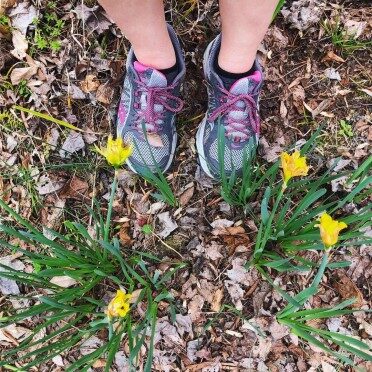
Image Description: Image of a forest floor with leaves and wild daffodils, taken from the perspective of a person looking down at their feet wearing tennis shoes.
And then came COVID. Non-emergent medical procedures (especially related to fertility) were canceled, and we were left with scary uncertainty. To keep my body safe, the journey to a second baby was paused for an indeterminate time. And yet, time continued its relentless march toward the end of my fertile years. As the world shut down, all my family plans were put on pause as I shifted to full-time teaching online and caring for my 3rd grader while he attempted virtual school. As a family living on campus, we had the surreal experience of exploring a campus that felt like a ghost town. Every day we walked a thin line between hope and despair. Luckily, after a delay of only a few months, our clinic resumed procedures, and even more luckily, I was pregnant by the end of May.
***
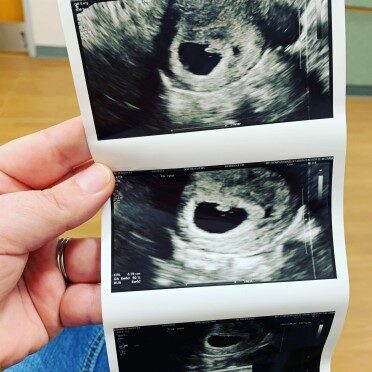
Image Description: An image of a hand holding a strip of ultrasound photographs picturing an embryo in the uterus.
The thing is, after going through so much together with my partner, COVID meant that I now had to go to all my medical appointments alone. Those scary appointments right after conception to check if it was another ectopic or miscarriage: alone. That glorious moment when I saw the heartbeat for the first time: alone. We shared our happy news with our loved ones via Zoom. After so much time carrying grief alone with my partner, we did know how to carry this joy alone; however, we didn’t want to. Yet the shelter-in-place and social distancing of COVID required us to hunker down to stay safe.

Image Description: An image of a nine-year-old child standing with their back to the camera at the entrance of a stone and grass labyrinth.
Due to these COVID precautions, there was no gathering of community to celebrate this baby. Our loved ones did their best: my mom, who lives across the country, crocheted a baby blanket I will treasure; our friends stopped by for a COVID-safe “sprinkle.” But to go through this very embodied, life-changing experience and not share it with the world was not what I expected, or dreamed of, after the pregnancy losses that preceded it. Moreover, it required sacrifices from all of us, perhaps most of all my son. At nine years old, school and his friendships were the center of his life. Not only did he have to give up in-person interactions with everyone but his mom and dad, but I could actively see my anxiety passing into him.
***
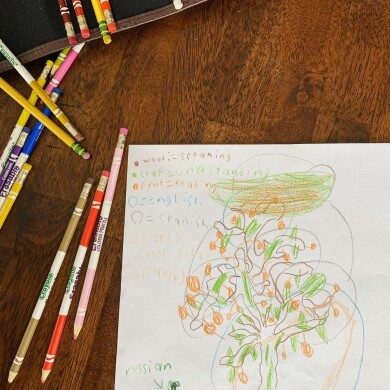
Description: Image of a child’s drawing of a tree heavy with fruit signifying their language use. Colored pencils are at the side.
While teaching online last fall, I brought my son into class. This was partially to keep things fresh in my teaching and partially to keep my son engaged in learning. One week, I had him join our lesson on second language acquisition. Students drew a visual representation of their SLA journeys, and my son is in a dual-language program. He pulled out his colored pencils and drew a bountiful tree, thriving in multiple languages. On another day, he shared a padlet he had created for a project in his 3rd grade class, providing a demonstration of teaching with technology for my TESOL class. My students loved his commentary, and he loved the interaction with college students!
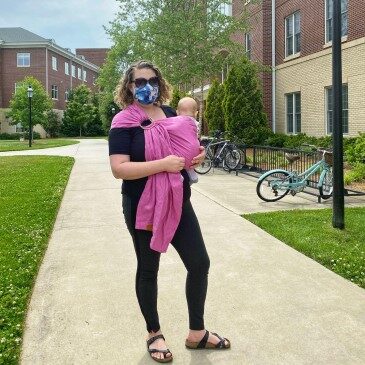
Image Description: An image of a woman with a facemask standing outside on a college campus wearing a baby in a bright pink wrap.
In contrast to my breaking down the barrier between personal and professional in my pandemic teaching, I wasn’t able to bring this pregnancy into my day-to-day life: my work days were spent as a disembodied head on a screen, all while my body changed and grew day-by-day. Although I live on campus as a faculty-in-residence, my remote accommodations for my pandemic pregnancy kept me at home and hidden away. I emerged this spring, vaccinated and with a newborn. Walking around campus, coworkers stopped me in surprise: how did enough time pass for us to be standing here with a new person in my life?
***
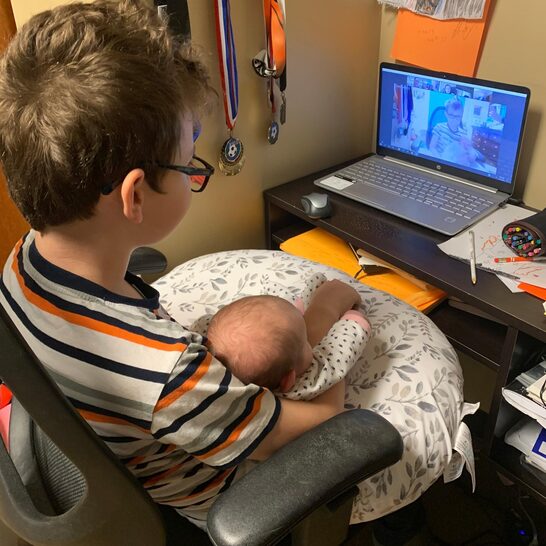
Image Description: An elementary-aged child holding an infant in an office chair, facing a laptop showing the baby to their online class.
This pandemic has upended life for virtually everyone on this planet, and my family has been no different. We recognize the privilege of being able to stay home, while also acknowledging the personal costs. My nine-year old son had to give up nearly all interactions with his peers and friends as online school was first the only option, and then as his class returned in-person, the only option for our family. I had to fight my HR department to get remote accommodations for my teaching. My whole family has navigated the—at times crippling—anxiety of trying to understand this virus, keep this baby safe, and fulfill our job and school duties. As a caregiver, wife, teacher, gestating body and now breastfeeding parent, I have tried to be open and transparent about doing everything at once.
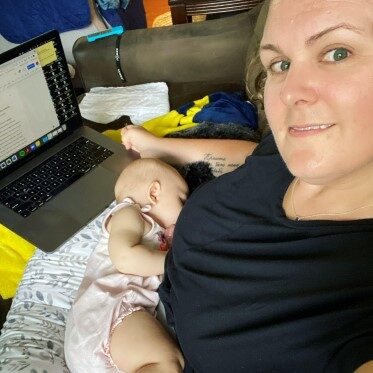
Image Description: A selfie taken by a woman holding a sleeping baby on a pillow across their lap next to their open laptop.
If 2020 was filled with constant micro-decisions to keep my body, my unborn baby, and my family safe, 2021 has been filled with continued decisions to minimize risk, as well as new calculations to minimize disruption. Do we send our son back to school? (Yes, but only with a mask mandate.) Do we send our new daughter to daycare? (No, let’s cover teaching with babysitters and hope for the best.) Does my husband find a new job that’s all remote? (Yes, thank god.) Do I return to in-person teaching? (Yes, but only that. Advocate for meetings to be virtual, or skip them entirely).
***
There is no easy resolution to my story—as I am still juggling two kids, a tenure-track job, and this pandemic—but I feel grateful to be able to talk about it. Perhaps talking more about parenthood in the academy, infertility and pregnancy loss, and the many complicated journeys we take to complete our families will help us all feel less alone. Whether on Twitter or in department meetings, I am so grateful to every single person that opens up about the complications in their lives, creating opportunities for connection and community. If there’s anything this pandemic has taught me, it is that community is everything.
Bio
Jennifer E. Eidum received her PhD in English Language and Rhetoric from the University of Washington, Seattle and is currently Assistant Professor of English at Elon University in North Carolina. Her research focuses on reflection and metacognition, teaching English as a second language, and pedagogies supporting linguistic diversity. In addition to teaching, Jennifer recently completed a 6-year term as live-in Faculty Director at Elon, a role which led to her forthcoming book, The Faculty Factor: Developing Faculty Engagement with Living Learning Communities.
